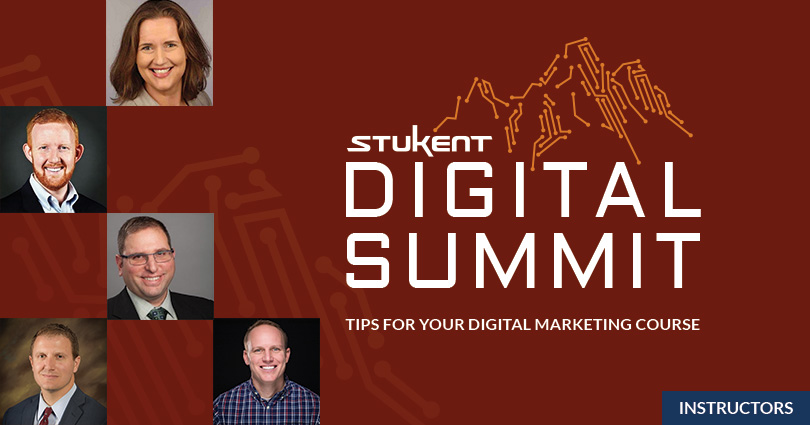Faculty development, conference announcement part of fall summit
Real-world projects, SEO, and certifications, as well as the announcement of an upcoming conference for professors were all topics of the Fall 2018 Stukent Digital Summit on Wednesday, Oct. 24.
Five speakers took to the virtual stage as instructors received insights on connecting students and clients, the benefits experiential learning, and more.
Digital Marketing Classes and Announcement
The first conference speaker, Stukent founder and CEO Stuart Draper, presented ideas on how to market digital marketing classes and shared sources for learning more about and staying atop digital marketing.

In speaking of ways to help grow a digital marketing program, Draper suggested that instructors invite company representatives into their classes to share what those companies look for when hiring a student. He also suggested involving of the university’s marketing society, leveraging a class assignment, and running a remarketing campaign, among other suggestions.
Explaining that he has heard the challenge instructors have in not being able to include all of the applicable digital marketing content into one course, Draper said, “You can make a case for more digital marketing courses or a digital marketing major on your campus.” Thoughts on how to do that included connecting with students and alumni on LinkedIn, using job board data, and utilizing video testimonials.
Next, Draper moved into ideas on how instructors can keep up-to-date on digital marketing. “As instructors, you’ve got to be looking for ways to stay current,” he said, suggesting that instructors subscribe to the best sources available, including Search Engine Land and Social Media Examiner.
Part of Draper’s presentation was also given to the announcement of ProfCon 2019, an in-person conference for college and high school marketing instructors to learn, prepare, and share. Registration is open for the event, which is slated for June 19-21, 2019, at Yellowstone National Park. Those who register by Dec. 1, 2018, will receive an early-bird discount.
Teaching SEO
In his presentation, “How to Teach SEO Like You Know What You’re Talking About,” Western MIchigan University digital marketing professor Scott Cowley made the point that “knowing SEO is not the same as knowing how to teach SEO.” He then presented best practices to help teachers up their SEO instruction.

Cowley talked of what instructors need to teach when it comes to SEO and where teachers should begin in that process. He also gave ideas about classwork for helping students retain important concepts.
Cowley shared what he teaches relative to local SEO and YouTube SEO, pointing out for the latter that “a lot of companies right now are investing in video, which means that students benefit if they understand how to get more exposure for company videos, for promotional videos, or for educational videos that they may end up making, either for themselves or for others.”
On the topic of website SEO instruction, Cowley pointed out how Google determines what webpage to show following a search. “I … reinforce this fact that if one page is ranking higher than another in search results, it’s either because that page is more relevant, or it’s more popular; or, in many cases, it’s a combination of both of those things — that concept is just so important to communicate.”
The presentation also included thoughts on instruction relative to search topic selection; keyword usage; the value of concept implementation; and SEO being thought of as a process, not as a set of terms.
Near the end of his presentation, Cowley called on teachers to “try [SEO] out for yourself before you expect students to be able to effectively do it. If you want to teach SEO like you know what you’re talking about then you have to have some experience doing what you are talking about.”
Real Client Work
Next up was Karen Freberg, strategic communication professor at the University of Louisville. She drew on teaching experience in presenting “How to Manage Real Client Work in the Classroom.” Freberg offered attendees access to teaching approaches and materials as she highlighted helpful practices for making client-connected school projects work.
 In talking of checklist items she incorporates when working with a client, she gave attention to the importance of expectations. “You want to make sure that you have a clear outline for the scope of the project,” she said, talking also of determining assignments and deadlines.
In talking of checklist items she incorporates when working with a client, she gave attention to the importance of expectations. “You want to make sure that you have a clear outline for the scope of the project,” she said, talking also of determining assignments and deadlines.
Drawing on a current project in which her students are working with the Breeder’s Cup, Freberg spoke of the project deliverables, analysis, and analytics, as well as promotion of the partnership.
During the presentation, Freberg talked about multiple benefits associated with real world projects, including hands-on experience for students; community connections; work that can be presented in job interviews; university partnerships; and brand exposure for students, the professor, and the university.
Freberg’s stance that marketing educators should better communicate what is taking place in academia was also presented. “We as professors need to be really at the forefront of advocating for what we are doing,” she said.
Conference attendees were also told of Freberg’s Facebook group for social media instructors, a community of over 900 members.
Experiential Learning
The summit’s next speaker, Brigham Young University-Idaho marketing instructor Matt Maroon, talked of helping students “become” through experiential learning.
 In his presentation, “Experiential Learning: Bringing the ‘Industry’ into the Classroom,” Maroon shared the value of networking assignments, internships, and simulations. He also advocated the replication of industry interactions within the classroom setting.
In his presentation, “Experiential Learning: Bringing the ‘Industry’ into the Classroom,” Maroon shared the value of networking assignments, internships, and simulations. He also advocated the replication of industry interactions within the classroom setting.
For Maroon, such replication takes place in the social media courses he teaches, when, over a four-week span, students gain experience through fulfilling assigned roles pertinent to social media marketing. As part of this approach, four-person teams are comprised.
“If you are the account executive, you are in charge of strategy,” he said. There is an account manager who focuses on creative aspects of a plan and available internal resources. There is an insights manager “really focusing on the data, pulling the information” and a client who receives the marketing pitch.
Maroon also spoke of another experiential learning experience of which he is a part, the BYU-Idaho program called Integrated Business Core (IBC). Implemented every semester and led by students, IBC is built of three courses — finance, marketing, and organizational effectiveness — and requires students to create, run, and shut down a business during a semester.
In speaking of the IBC experience, Maroon referenced quick turn-around times the students work through, noting that students create impressive work within as little time as an hour. “It’s really, really incredible seeing the potential that our students have if we are willing to unleash it and provide a format that allows them to really flourish,” he said.
Professional Certifications
The conference’s final presenter, Rich Hanna, a marketing professor at Babson College, gave perspective on using professional certifications as part of students’ classroom experience.
 He shared “basics” of certifications and ideas on what to expect when incorporating them into a course. While he acknowledged that there are concerns that arise when implementing certification processes into a class setting, Hanna said, “the good outweighs the bad.”
He shared “basics” of certifications and ideas on what to expect when incorporating them into a course. While he acknowledged that there are concerns that arise when implementing certification processes into a class setting, Hanna said, “the good outweighs the bad.”
By way of “the good,” Hanna pointed to the value of building student resumes and of allowing students to show employers competence in expected areas of knowledge. Also, the quality of certifications is “generally very good,” he said. “I can’t recommend both the Google and HubSpot certifications enough.”
Hanna also pointed out that incorporating certifications allows for flipping the classroom and for providing variety to the students’ instruction. The use of certifications can also help instructors increase knowledge, he said, provide for instruction that may not be conducive in class, and open opportunities for certification scores to be connected to class credit.
As indicated, the presentation also included concerns for instructors to consider relative to certifications. Hanna listed six, including the possibility of students “gaming” the certification process, potential procrastination by students, and the challenge of integration.
A final takeaway of Hanna’s presentation was the importance of instructors having familiarity with a certification that will be used for class. “You definitely need to train on these first yourself,” he said, “not just to learn the materials, but so that you know what the students are going to be doing.”
Hanna pointed out that certification familiarity will allow an instructor to “be prepared for any of the questions that may come up, [students’] ability to get the certification done and passed in, and just so that you can use the material in your class and complement what you’re doing.”
Virtual Conferences
The Fall 2018 Stukent Digital Summit marks the second time this year that Stukent has gathered educators virtually to hear presentations on digital marketing instruction. In June there was a similar conference. That event included sessions from both academics and industry. You can access the sessions from the Summer 2018 Stukent Digital Summit here.






